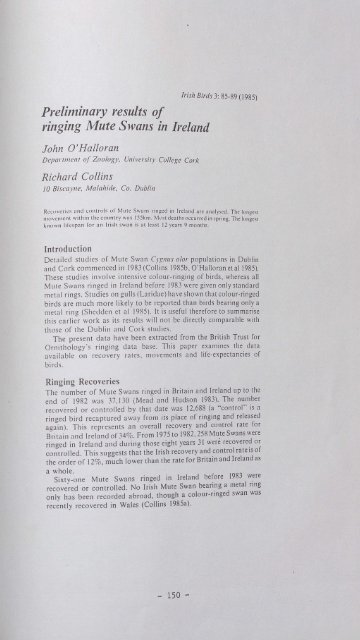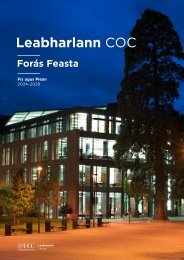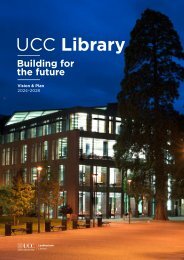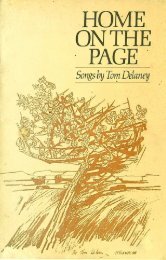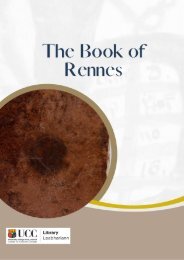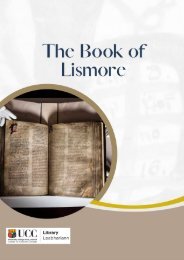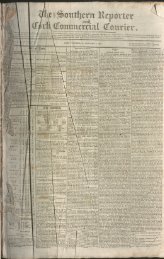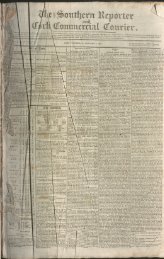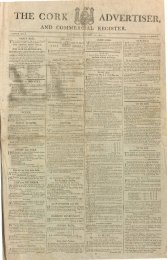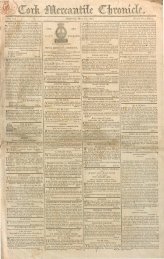Lead Toxicity in Mute Swans
LEAD TOXICITY IN MUTE SWANS Cygnus olor (Gmelin). By JOHN O'HALLORAN A thesis submitted to the National University of Ireland in candidature for the degree of Doctor of Philosophy September 1987
LEAD TOXICITY IN MUTE SWANS
Cygnus olor (Gmelin).
By
JOHN O'HALLORAN
A thesis submitted to the National University of Ireland
in candidature for the degree of Doctor of Philosophy
September 1987
You also want an ePaper? Increase the reach of your titles
YUMPU automatically turns print PDFs into web optimized ePapers that Google loves.
Prel<strong>in</strong>1<strong>in</strong>ary results of<br />
r<strong>in</strong>g<strong>in</strong>g <strong>Mute</strong> <strong>Swans</strong> <strong>in</strong> Ireland<br />
John O'Halloran<br />
Department of Zoology, University College Cork<br />
Richard Coll<strong>in</strong>s<br />
10 Biscayne, Malahide, Co. Dubl<strong>in</strong><br />
Irish Birds 3: 85-89 ( 1985)<br />
Recoveries a~1d .controls of <strong>Mute</strong> <strong>Swans</strong> r<strong>in</strong>ged <strong>in</strong> Ireland are analysed . The longest<br />
nl(l\'emcn.l w1tl111~ the country was ~ 55km. ~fost deaths occurred <strong>in</strong> spr<strong>in</strong>g. The longest<br />
known lilcspan lor an Irish swan 1s at least 12 years 9 months.<br />
Introduction<br />
Detailed studies of <strong>Mute</strong> Swan Cygnus olor populations <strong>in</strong> Dubl<strong>in</strong><br />
and Cork commenced <strong>in</strong> 1983 (Coll<strong>in</strong>s l 985b, O'Halloran et al 1985).<br />
These studies <strong>in</strong>volve <strong>in</strong>tensive colour-r<strong>in</strong>g<strong>in</strong>g of birds, whereas all<br />
<strong>Mute</strong> <strong>Swans</strong> r<strong>in</strong>ged <strong>in</strong> Ireland before 1983 were given only standard<br />
metal r<strong>in</strong>gs. Studies on gulls (Laridae) have shown that colour-r<strong>in</strong>ged<br />
birds are much more likely to be reported than birds bear<strong>in</strong>g only a<br />
metal r<strong>in</strong>g (Shedden et al 1985). lt is useful therefore to summarise<br />
this earlier work as its results will not be directly comparable with<br />
those of the Dubl<strong>in</strong> and Cork studies.<br />
The present data have been extracted from the British Trust for<br />
Ornithology's r<strong>in</strong>g<strong>in</strong>g data base. This paper exam<strong>in</strong>es the data<br />
available on recovery rates, movements and life-expectancies of<br />
birds.<br />
R<strong>in</strong>g<strong>in</strong>g Recoveries<br />
The number of <strong>Mute</strong> <strong>Swans</strong> r<strong>in</strong>ged <strong>in</strong> Brita<strong>in</strong> and Ireland up to the<br />
end of 1982 was 37. I 30 (Mead and Hudson 1983). The number<br />
recovered or controlled by that date was 12,688 (a "control" is a<br />
r<strong>in</strong>ged bird recaptured away from its place of r<strong>in</strong>g<strong>in</strong>g and released<br />
aga<strong>in</strong>). This represents an overall recovery and control rate for<br />
Brita<strong>in</strong> and Ireland of 34%. From 1975 to 1982, 258 <strong>Mute</strong> <strong>Swans</strong> were<br />
r<strong>in</strong>ged <strong>in</strong> Ireland and dur<strong>in</strong>g those eight years 31 were recovered or<br />
controlled. This suggests that the Irish recovery and control rate is of<br />
the order of 12%, much lower than the rate for Brita<strong>in</strong> and Ireland as<br />
a whole.<br />
Sixty-one <strong>Mute</strong> <strong>Swans</strong> r<strong>in</strong>ged <strong>in</strong> Ireland before 1983 w~re<br />
recovered or controlled. No Irish <strong>Mute</strong> Swan bear<strong>in</strong>g a metal rmg<br />
only has been recorded abroad, though a colour-r<strong>in</strong>ged swan was<br />
rec~ntly recovered <strong>in</strong> Wales (Coll<strong>in</strong>s l 985a).<br />
- 150 -


